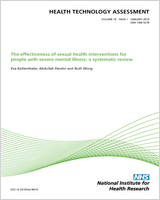Included under terms of UK Non-commercial Government License.
NCBI Bookshelf. A service of the National Library of Medicine, National Institutes of Health.
Wright B, Marshall D, Adamson J, et al. Social Stories™ to alleviate challenging behaviour and social difficulties exhibited by children with autism spectrum disorder in mainstream schools: design of a manualised training toolkit and feasibility study for a cluster randomised controlled trial with nested qualitative and cost-effectiveness components. Southampton (UK): NIHR Journals Library; 2016 Jan. (Health Technology Assessment, No. 20.6.)

Social Stories™ to alleviate challenging behaviour and social difficulties exhibited by children with autism spectrum disorder in mainstream schools: design of a manualised training toolkit and feasibility study for a cluster randomised controlled trial with nested qualitative and cost-effectiveness components.
Show detailsBackground
In this chapter, the characteristics, role and purpose of the three different groups involved in the development of the intervention are outlined. The process by which the views of each of these groups were integrated in the final version of the intervention is also described (see Figure 2).

FIGURE 2
The process of development of the intervention.
Objectives
- To develop a manual and training package for Social Stories that could be used in mainstream schools and could be evaluated in the feasibility study.
Component groups
User groups
These groups consisted of users of Social Stories whose views were obtained through a series of qualitative interviews and focus groups (see Chapter 4). Users in this context included parents (or carers), teachers, health professionals and young people with ASD. The role of these groups was to express to a qualitative researcher their experiences of and beliefs around the writing and delivery of Social Stories. There were two stages of this process. The objectives of each of these stages were:
- to gather information relating to the optimum design and use of Social Stories for children with ASD
- to explore the views of users on whether the intervention can feasibly be delivered in this particular context and to ensure the intervention is acceptable to service users and providers.
Expert panel
The expert panel comprised people with knowledge of Social Stories, training delivery in a Child and Adolescent Mental Health Service (CAMHS) setting, and ASD. It also consisted of three PPI representatives (two parents of children with ASD and a representative from the National Autistic Society) and the qualitative researcher who analysed the findings from the user groups (see Chapter 4). Their role was to support a writing group to develop a Social Stories training package including a manual by evaluating, marshalling and representing the evidence and information from the systematic review, user group feedback and the thematic analysis from the qualitative researcher. The objectives of the expert panel were:
- to provide expert opinions on the creation and use of Social Stories
- to synthesise and evaluate the information arising from the systematic review and user groups and present this to the writing group
- to review drafts of the manual at regular intervals to ensure that the findings from the systematic review and the views of the user groups had been represented appropriately.
Expert writing group
The expert writing group comprised a subset of those on the expert panel. It had five members including Carol Gray and two PPI representatives. Their role was to take direct responsibility for the writing of the manual and assembling the training package from the recommendations of the expert panel. The objectives of the expert writing group were:
- to produce a manual on writing and using Social Stories based on information gained from the systematic review, the expert opinions, user group feedback and the thematic analysis from the qualitative researcher
- to produce a training package to teach how to write and use Social Stories which will also provide familiarisation with the manual.
The process
An iterative approach was used in which Social Story users in the user groups were interviewed and this information was fed back to the expert panel by the qualitative researcher. Once this information was considered by this panel they would ask the qualitative researcher to elicit more responses from the user groups and ask for feedback on drafts of the manual they had completed. The user group and expert panel were conducted separately at the request of PPI representatives as a mechanism for ensuring that their voices were not drowned out by clinicians or academics. The important need to bring the groups together was met by three mutually agreed meetings where two representatives of each user group, parents and professionals (see Chapter 5) were given opportunities to speak directly to the expert panel.
Once this process was complete, a final draft of the manual and training package was produced for use in a pilot study with a small number of participants (see Chapter 6). The feedback from this study was then considered by the expert panel and writing group, and subsequently represented in the final version of the manual and training package offered in the feasibility study. A graphical depiction of this process of development is shown in Figure 2.
- Phase 1: the process of developing the intervention - Social Stories™ to allevia...Phase 1: the process of developing the intervention - Social Stories™ to alleviate challenging behaviour and social difficulties exhibited by children with autism spectrum disorder in mainstream schools: design of a manualised training toolkit and feasibility study for a cluster randomised controlled trial with nested qualitative and cost-effectiveness components
- Example participant information sheets and consent forms in original formatting ...Example participant information sheets and consent forms in original formatting - Social Stories™ to alleviate challenging behaviour and social difficulties exhibited by children with autism spectrum disorder in mainstream schools: design of a manualised training toolkit and feasibility study for a cluster randomised controlled trial with nested qualitative and cost-effectiveness components
Your browsing activity is empty.
Activity recording is turned off.
See more...